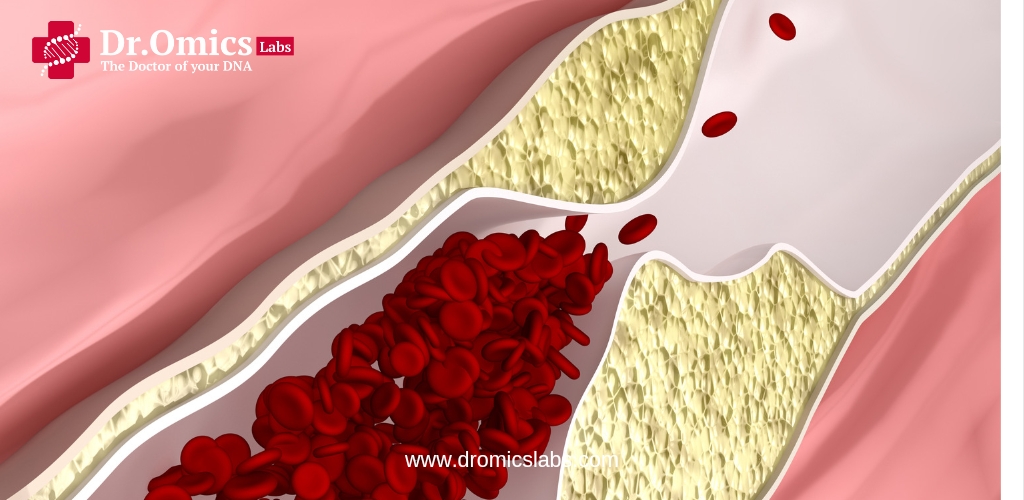The transfer of genes occurs from parents to children, along with inheriting the qualities of the parents, including the potential for diseases that may affect the children. One such disease is cardiovascular disease. Whenever the topic of genes is discussed, it is essential to understand that the inherited genes also come with potential risks. In today’s blog, we will explore the role of genes in cardiovascular diseases.
Firstly, let’s discuss what cardiovascular disease is and the factors other than genes that can contribute to it. If identified before the onset of the disease, it becomes easier to find solutions. In this context, Dr. Omics is working.
Through DNA testing, Dr. Omics informs you in advance about the diseases you may be prone to. This proactive approach allows for the prevention or mitigation of these diseases before they occur, avoiding potential harm.
Role of Genetics in Cardiovascular Diseases
What is Cardiovascular Diseases (CVD)
Cardiovascular disease refers to a class of diseases that involve the heart or blood vessels. This includes conditions such as coronary artery disease, heart failure, valvular heart diseases, and others. The primary cause of cardiovascular diseases is the gradual buildup of plaque in the arteries, leading to reduced blood flow to the heart or other parts of the body.
Apart from genetic factors, several lifestyle and environmental elements contribute to the development of cardiovascular diseases.
These factors include:
Unhealthy Diet: Diets high in saturated fats, trans fats, and cholesterol can contribute to the accumulation of plaque in the arteries.
Lack of Physical Activity: Sedentary lifestyles and lack of regular exercise can increase the risk of cardiovascular diseases.
Smoking: Tobacco smoke contains chemicals that can damage blood vessels and heart tissue, increasing the risk of heart disease.
Excessive Alcohol Consumption: Drinking excessive amounts of alcohol can elevate blood pressure and contribute to heart problems.
Obesity: Being overweight or obese is a significant risk factor for cardiovascular diseases.
High Blood Pressure: Hypertension puts extra strain on the heart and blood vessels, increasing the risk of heart disease.
Diabetes: People with diabetes are at a higher risk of developing cardiovascular diseases.
Age and Gender: The risk of cardiovascular diseases increases with age, and men generally have a higher risk compared to premenopausal women.
Cardiovascular diseases (CVD) are influenced by a combination of genetic and environmental factors. Understanding the genetic basis of CVD is crucial for early detection, prevention, and personalized treatment.
Also Read this – Scientists Uncover New Genetic Links to Heart Disease
Understanding Genetic Risk for Heart Disease
Genes play a significant role in the development of cardiovascular diseases. According to the University of Chicago Medicine, “Genetics can influence the risk for heart disease in many ways.” It is important to note that a genetic variation (mutation) in a single gene can affect the likelihood of developing heart disease. Therefore, individuals with a family history of CVD should be aware of their genetic predisposition and consider genetic testing for inherited cardiovascular diseases.
Types of Inherited Cardiovascular Diseases
There are various types of inherited cardiovascular diseases, including cardiomyopathy, cardiac amyloidosis, arrhythmias, and congenital heart diseases. These conditions are often passed from parents to children, and individuals with a family history of these diseases may have an increased risk of developing CVD.
Genetic Testing and Screening
Genetic testing is informative and useful for the clinical management of various inherited cardiovascular diseases. Screening for genetic heart disease is recommended for individuals with a family history of CVD, as early detection can help in identifying risk factors and initiating preventive measures.
The Impact of Lifestyle and Genetics
While genetics play a significant role in predisposing individuals to CVD, lifestyle factors such as diet, exercise, and smoking also contribute to the overall risk of developing cardiovascular diseases. It is essential to understand that a combination of genetic predisposition and unhealthy lifestyle choices can significantly increase the risk of CVD.
In conclusion, genetics plays a crucial role in the development of cardiovascular diseases. Individuals with a family history of CVD should be proactive in understanding their genetic risk and consider genetic testing and screening for early detection and preventive measures.
References
[2] https://www.ncbi.nlm.nih.gov/pmc/articles/PMC7006335/
[3] https://www.ncbi.nlm.nih.gov/pmc/articles/PMC2781194/




